Clinical Trials 2021: National Tribute and Award Ceremony
The Australian Clinical Trials Alliance, together with our event partners MTPConnect, Bellberry and Medicines Australia, and supporters, the National Health and Medical Research Centre (NHMRC), CT:IQ, Medical Technology Association of Australia (MTAA), and Research Australia, hosted the 2021 National Tribute & Awards Ceremony on May 20th 2021 to mark International Clinical Trials Day and celebrate the announcement of the ACTA Trial of the Year Awards.
The event, held at the Melbourne Convention and Exhibition Centre in Melbourne, was attended by 80 invited attendees in person and many more online, including heads of ACTA Member groups, senior clinical researchers, clinicians, research coordinators, consumer representatives, academic heads, health services executives and senior policymakers. We are grateful to the Chairs, Prof John Zalcberg OAM and Prof Steve Webb, and keynote speaker, Prof Anne Kelso AO, NHMRC CEO. The event exhibited the tremendous value of investigator-driven trials conducted in Australia and brought together public health, industry and consumer representatives to honour all those who advance healthcare by making ground-breaking clinical trials possible.
Watch the Video Recording of the Live Webcast

The ACTA Trial of the Year Award was established in 2016 to honour and celebrate the outstanding Australian achievements that advance clinical practice and save or improve the lives of patients every year through collaborative, multicentre, investigator-driven clinical trials. A peer-led panel of senior trialists and consumer representatives appointed by the ACTA Board judges the trial that is the best demonstration of the following standards:
- It addressed a critical gap in the evidence or a significant innovation in healthcare delivery
- The quality of the research design, conduct and analysis were outstanding
- There is a high likelihood that findings from the trial will significantly impact clinical practice and/or policy and improve outcomes for patients or healthcare delivery.
The ACTA Statistics in Trials Special Interest Group (ACTA STInG) Excellence in Trial Statistics Award was established in 2017 to recognise the unique and critical role of specialist trial statisticians within the clinical trials sector.
The ACTA Consumer Involvement Award was first held in 2019 to recognise and celebrate the outstanding achievements of our Members who advance clinical practice and save or improve the lives of patients every year through consumer involvement in investigator-driven clinical trials. Trials considered for the award were collaboratively developed, multicentre, investigator-driven, randomised controlled trials that demonstrated exceptional creative and collaborative initiatives involving consumers and were designed to improve patient-centred outcomes or healthcare delivery.
On behalf of all members of the ACTA Community, we extend our congratulations to the many thousands of people – clinicians, researchers, consumers and participants – who were involved in the outstanding trials nominated for the 2021 ACTA Trial of the Year Award.
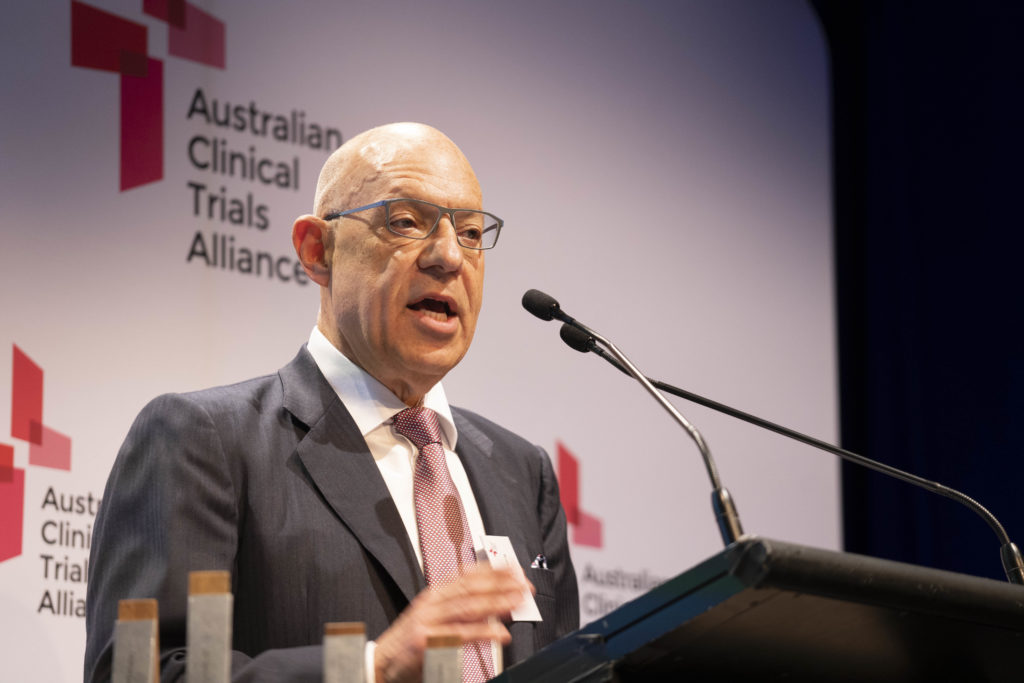
Prof John Zalcberg OAM 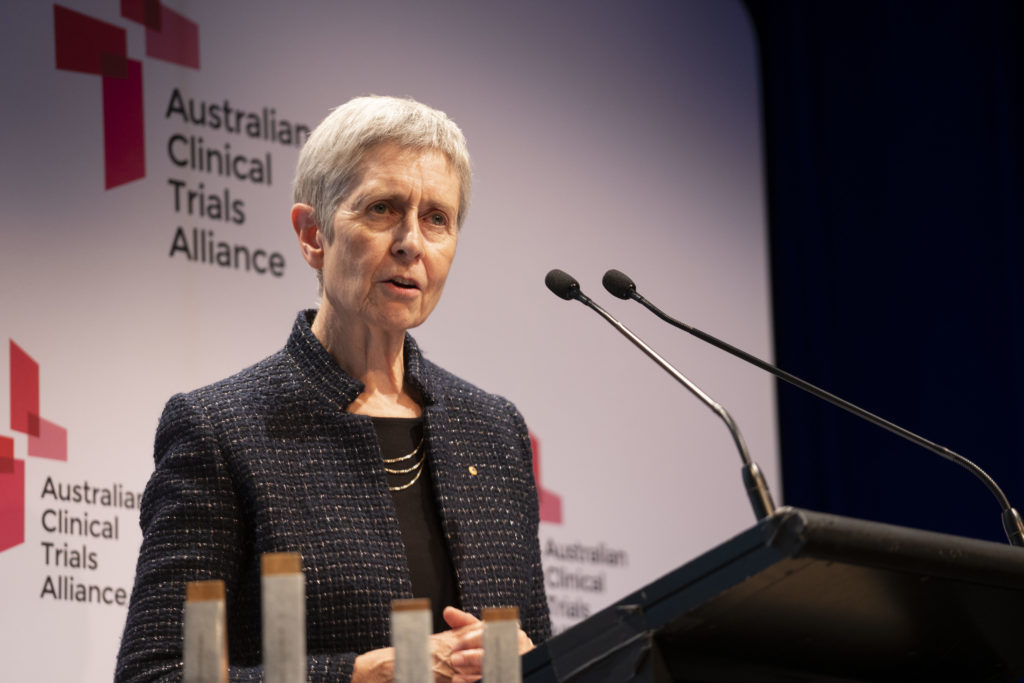
Prof Anne Kelso AO 
2021 Awards 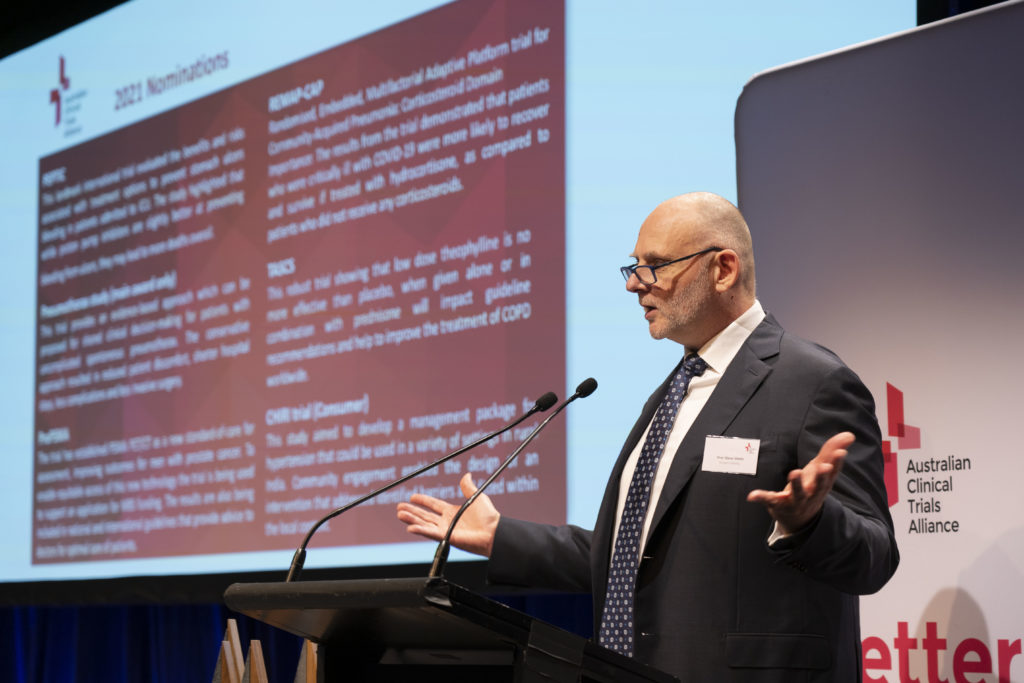
Prof Steve Webb 
Prof Andrew Forbes and Prof Anne Kelso 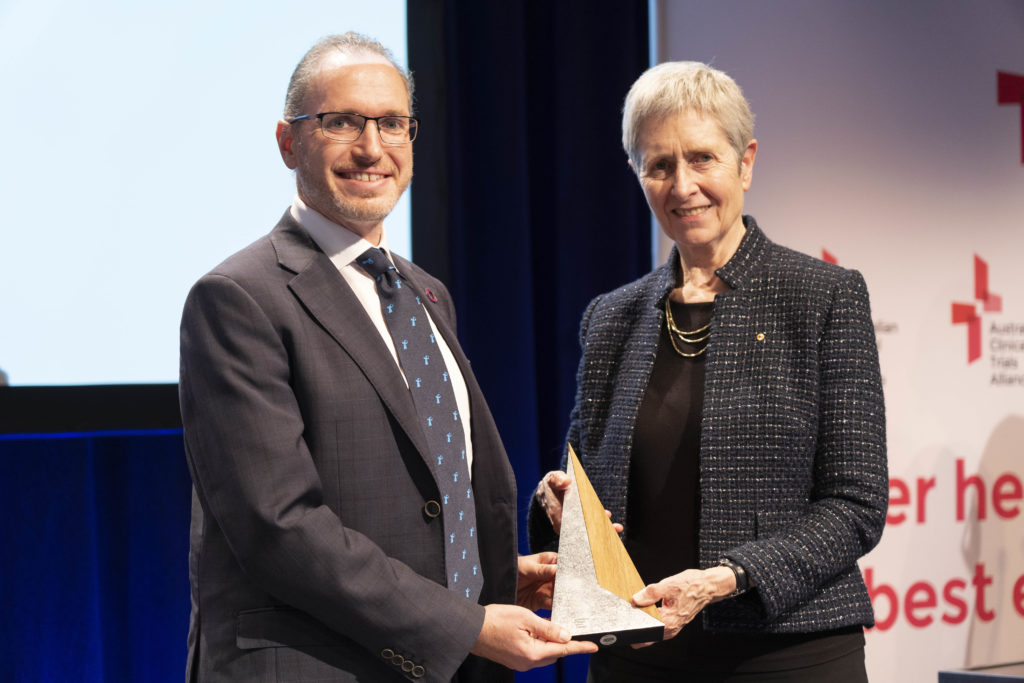
Prof Michael Hofman and Prof Anne Kelso 
Prof Simon Brown and Prof Anne Kelso 
Prof David Pilcher and Prof Anne Kelso 
Mr Micah Garfinkel 
Mr Mark Sibree 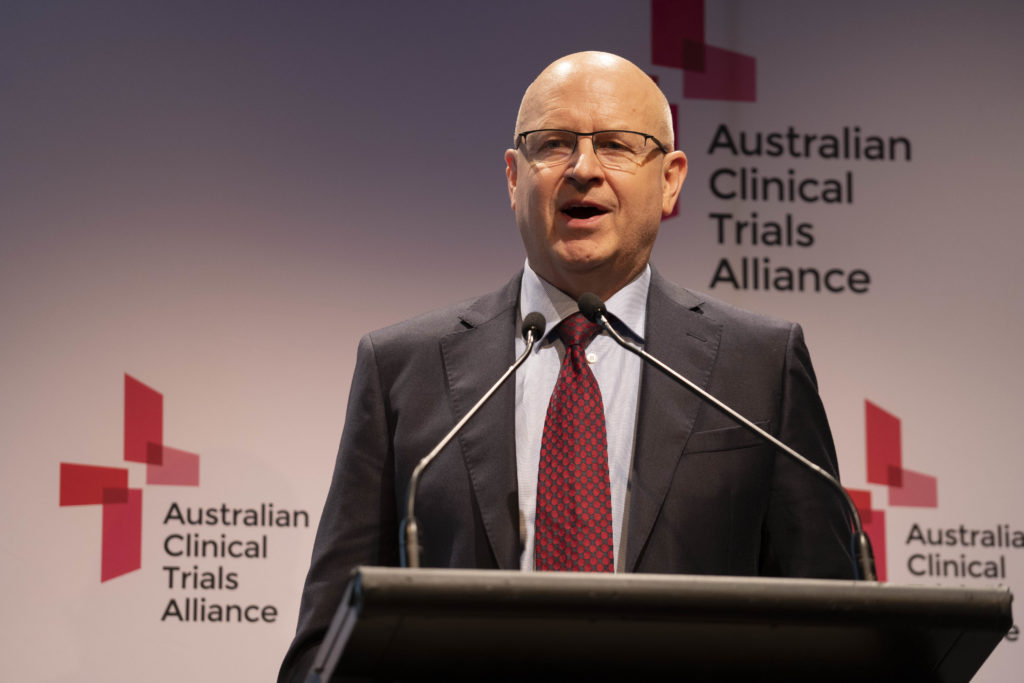
Dr Dan Grant 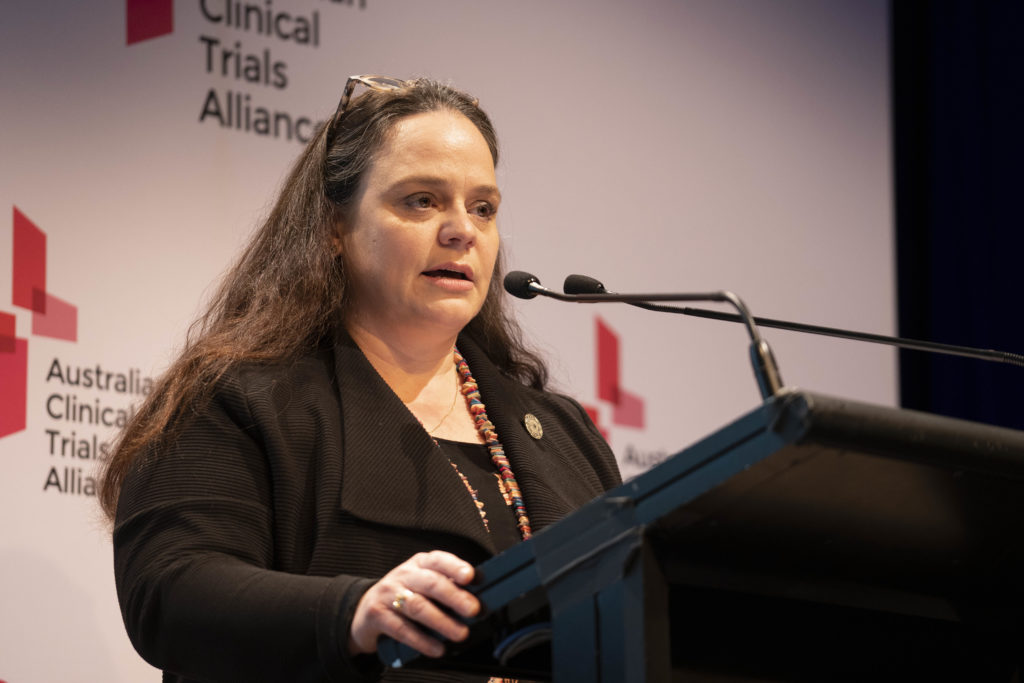
Dr Kylie Sproston 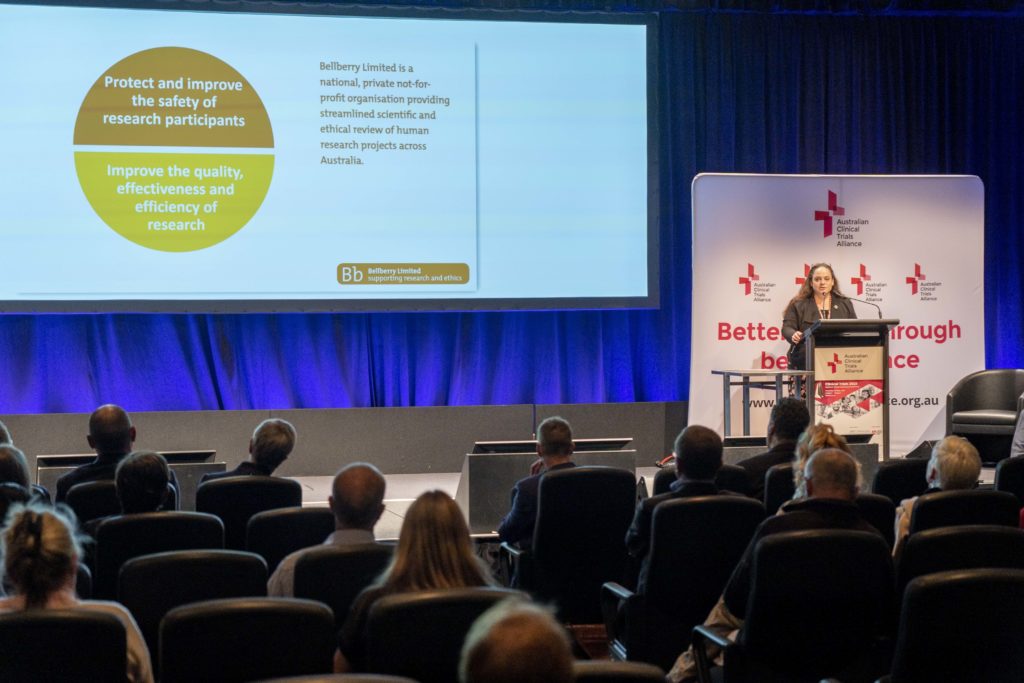


In 2021, the nominees were of such high quality, that the two equal winners of Trial of the Year were awarded.
ACTA 2021 Trial of the Year Award Winner: ProPSMA
- Conducted by: Australasian Radiopharmaceutical Trials Network (ARTnet)
- Chief Investigator: Prof Michael Hofman
- Coordinating by: Centre for Biostatistics and Clinical Trials (BaCT), Peter MacCallum Cancer Centre
- Citation: Lancet. 2020 Apr 11;395(10231):1208-1216. doi: 10.1016/S0140-6736(20)30314-7. Epub 2020 Mar 22.
Equal winner of the 2021 Trial of the Year Award is the Prostate-specific membrane antigen PET-CT in patients with high-risk prostate cancer before curative-intent surgery or radiotherapy (proPSMA): a prospective, randomised, multicentre study.
Prof Michael Hofman MBBS, FRACP, FAANMS, FICIS, accepted the award and was joined by trial participant, Mark Sibree.
The ProPSMA clinical trial demonstrated that a new medical imaging scan was more accurate than standard imaging in men with newly diagnosed prostate cancer. The study used a new technique called PSMA PET/CT that provides a whole body three dimensional scan showing sites of prostate cancer spread as small as 2-3mm in size. This technology uses a radioactive substance that detects a molecule called prostate specific membrane antigen (PSMA) which is found in high levels on the surface of prostate cancer cells. Patients then undergo a PET/CT scan producing detailed images of prostate cancer spread.
300 men with a new diagnosis of prostate cancer at ten sites across Australia participated in the study. These men were being considered for surgery or radiotherapy and had a high-risk of aggressive disease that could have already spread beyond the prostate. They were randomly assigned to conventional imaging (CT and bone scan) or the new scan, a PSMA PET/CT. The results showed that PSMA PET/CT is more accurate than conventional imaging (accuracy of 92% vs 65%). This was because the new technique was better at detecting small sites of tumour spread. The study also showed that PSMA PET/CT had fewer uncertain findings (7% vs 23%), and had a great impact on the way patients’ disease was managed. PSMA PET/CT results led to 28% of men having their treatment plans changed compared to 15% whose treatment plans changed with conventional imaging.
The ProPSMA clinical trial has established PSMA PET/CT as a new standard-of-care for the assessment of men with prostate cancer. PSMA PET/CT was approved by the US Food and Drug Administration in November 2020. The results are being used to support an application to the Australian Government to provide MBS funding for PSMA PET/CT and enable equitable access of this new technology. The results are also being included in national and international guidelines that provide advice to doctors for optimal care of patients. ProPSMA also led to the establishment of an Australian network of sites with expertise in PSMA imaging and also PSMA therapy, an emerging targeted treatment that can improve outcomes for men with prostate cancer.
ACTA 2021 Trial of the Year Award Winner: Pneumothorax study
- Conducted by: Australasian College for Emergency Medicine Clinical Trial Network (ACEM CTN)
- Chief Investigator: Prof Simon Brown
- Coordinating by: Centre for Clinical Research in Emergency Medicine, Department of Emergency Medicine, Royal Perth Hospital and The University of Western Australia
- Citation: N Engl J Med. 2020 Jan 30;382(5):405-415. doi:10.1056/NEJMoa1910775
The second equal winner of the 2021 Trial of the Year Award is the randomised controlled trial of conservative versus interventional treatment for spontaneous pneumothorax.
Prof Simon G A Brown MBBS PhD FACEM, accepted the award and was joined by trial participant, Micah Garfinkel.
Prior to this clinical trial, patients with a collapsed lung (‘spontaneous pneumothorax’) were routinely treated by inserting a needle or catheter into the chest to suck out the air around the collapsed lung, to ‘reinflate’ the lung. This was associated with significant pain, discomfort, prolonged stays in hospital and invasive surgery.
The trial compared this traditional ‘invasive’ approach to a more ‘conservative’ approach of simply observing the patient and only doing an intervention if absolutely necessary.
The conservative approach resulted in reduced patient discomfort, shorter hospital stays, less complications and less invasive surgery.
An evidence-based approach can now be proposed for shared clinical decision-making for patients with uncomplicated spontaneous pneumothorax. Most patients can be managed by watchful waiting, with only 15% of these patients requiring subsequent interventional management (chest tube insertion +/- surgery). As well as providing better outcomes for patients, this enables significant cost-savings for the health system.
ACTA STInG Excellence in Statistics Award Winner and Trial of the Year Finalist: PEPTIC
- Conducted by: ANZICS Clinical Trials Group (Australian and New Zealand Intensive Care Society)
- Chief Investigator: Prof Paul Young
- Coordinated by: Australian and New Zealand Intensive Care Research Centre
- Citation: JAMA. 2020;323(7):616–626. doi:10.1001/jama.2019.22190
The winner of the ACTA STInG Excellence in Trial Statistics Award and runner-up for the 2021 ACTA Trial of the Year Award is PEPTIC, the effect of stress ulcer prophylaxis with proton pump inhibitors vs. Histamine-2 receptor blockers on inhospital mortality among ICU patients with invasive mechanical ventilation.
Prof Andrew Forbes and Prof David Pilcher accepted the ACTA STInG Excellence in Trial Statistics Award and 2021 ACTA Trial of the Year Finalist Award, respectively.
When patients are sick enough to require treatment in a hospital intensive care unit (ICU), many are put on medicines to prevent bleeding from stomach ulcers. For decades, intensive care doctors have prescribed one of two types of ulcer-preventing medicines: proton pump inhibitors (PPIs) such as Losec (the trade name for omeprazole)*, or histamine-2 receptor blockers (H2RBs) such as Zantac (the trade name for ranitidine)*. PPIs are among the most commonly prescribed medicines in the world.
The PEPTIC study was published in the Journal of the American Medical Association (JAMA). It compared the risk of death with these different types of ulcer-preventing medicines when used on patients in the ICU. It found that while PPIs are slightly better at preventing bleeding from ulcers, they might actually lead to more deaths overall.
The landmark three-year study, the largest ever randomised clinical trial ever undertaken in critically ill patients internationally, included almost 27,000 patients from 50 ICUs in 5 countries; Australia, New Zealand, the UK, Ireland and Canada.
ACTA STInG Excellence in Statistics and ACTA Trial of the Year Awards Commendations: REMAP-CAP
- Conducted by: School of Public Health and Preventive Medicine, Monash University and Australian and New Zealand Intensive Care Society Clinical Trials Group
- Chief Investigator: Prof Steve Webb
- Coordinated by: Australian and New Zealand Intensive Care Research Centre
- Citation: JAMA. 2020;324(13):1317-1329. doi:10.1001/jama.2020.17022
Commendations for the ACTA STInG Excellence in Statistic and ACTA Trial of the Year Awards were given to the REMAP-CAP study: Randomised, Embedded, Multifactorial Adaptive Platform trial for Community-Acquired Pneumonia: Corticosteroid Domain.
ACTA Consumer Involvement Commendation: CHIRI
- Conducted by: CHIRI Investigator Group
- Chief Investigator: Amanda Thrift
- Coordinated by: Monash University
- Citation: PLoS Med. 2020;17(1): e1002997. https://doi.org/10.1371/journal.pmed.1002997
A commendation for the ACTA Consumer Involvement Award was given to the CHIRI study: Improving the control of hypertension in rural India: Overcoming barriers to diagnosis and effective treatment.
ACTA congratulates the trial investigators, coordinators, consumers and participants on the outstanding work that has been achieved in these and all nominated trials.
Our sincere thanks to our event partners and supporters for helping to bring this collaborative event together


